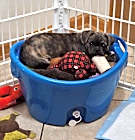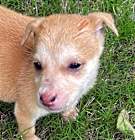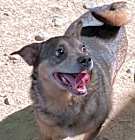A Shorkie is a designer dog breed that results from crossing a Shih Tzu with a Yorkshire Terrier. They are small dogs known for their affectionate personalities and cute appearances, with traits — such as a silky coat, floppy ears, and a friendly disposition — inherited from both parent breeds. They tend to be loyal companions and can make great pets for families or individuals living in apartments or other small spaces.
Shorkie
Breed Type: Crossbreed
Coat: Silky
Hypoallergenic: Yes, they may not trigger allergies.
Temperament: Friendly, playful, outgoing, affectionate
Life expectancy: 12-15 years
Color & patterns:

The Shorkie is a delightful blend of two beloved canine companions: the Shih Tzu and the Yorkshire Terrier. Shorkies typically inherit the lavish coat of their Shih Tzu parent, often with a variety of colors and patterns, ranging from silky smooth to long and flowing. If you're seeking a compact canine companion, look no further than the delightful Shorkie.
Shorkie characteristics
Learn about about Shorkie basics like their fur colors, shedding levels, how much grooming they need, and other Shorkie facts.
Average height
6-14 inches (15.2-35.6cm)
Average weight
4-15 pounds (1.8-6.8 kg)
Average lifespan
12-15 years
Exercise needs
Grooming needs
Full-grown size
Good with cats
Good with kids
Training aptitude
What colors do Shorkies come in?
Shorkies come in black, brown, white, gold, tan, sable, brindle, and silver. They can have various patterns and markings, such as solid colors, bi-color, tri-color, or parti-color (patches of two or more colors). The specific color and pattern of a Shorkie’s coat can vary widely due to genetics inherited from their parent breed.
How big do Shorkies get?
Shorkies weigh between four to 15 pounds and stand about six to 14 inches tall at the shoulder. The exact size of a Shorkie can vary depending on factors such as genetics, diet, and overall health.
What do Shorkies look like?
Shorkies look like a cross between a Yorkshire Terrier and a Shih Tzu. They tend to be small dogs with a sturdy build. They have rounded heads with dark, expressive eyes and short muzzles. Their ears may be floppy or semi-floppy, and they often carry their tails high over their backs. Their coats are usually long and silky, often with a slight wave or curl.
How long do Shorkies live?
Shorkies live between 12 to 15 years, but it’s not uncommon for them to live longer with proper care and attention to their health needs. Regular veterinary check-ups, a balanced diet, appropriate exercise, dental care, and maintaining a healthy weight can help boost a Shorkie’s health and lifespan.
When do Shorkies stop growing?
Shorkies stop growing in height around nine to 12 months of age. However, they may continue to fill out and develop muscle tone for several more months after reaching their full height. By the time a Shorkie is around a year old, they have most likely reached their adult size and weight.
Do Shorkies shed?
Yes, Shorkies do shed, but not much. Shorkies are often considered low-shedding due to their Shih Tzu and Yorkshire Terrier parentage, both of which have hair rather than fur. Because shedding tendencies can vary by dog, regular grooming may be required to maintain their coats and minimize shedding.
Shorkie history
Learn about where this Shorkie came from!
What were Shorkies bred for?
Shorkies were bred for companionship and to be family pets. Breeders aimed to combine the desirable traits of the Shih Tzu and Yorkshire Terrier to create a small, affectionate, and friendly dog that would make an ideal companion for people looking for a loyal, loving pet.
Where do Shorkies come from?
Shorkies are believed to have originated in the United States, where they gained popularity as adorable, affectionate pets. As with any mixed breed, the history and development of Shorkies can vary due to different breeding practices.
Shorkie temperament
Learn about about the Shorkie temperament and how well they fit into your lifestyle, home environment, and family.
Are Shorkies good with kids?
Yes, Shorkies are good with kids, especially when they are raised together and have been properly socialized from a young age. These dogs have friendly and affectionate personalities, making them well-suited for interacting with children. Shorkies often enjoy playing and spending time with family members, including kids, and can form strong bonds with them.
As with any dog breed, it’s essential for pet parents and parents of children to supervise interactions between Shorkies and kids, especially younger ones, to ensure mutual respect and safety. Teaching children how to safely interact with dogs can help prevent any potential misunderstandings or accidents, and it's also important for pet parents to teach their dogs how to gently interact with children.
Are Shorkies friendly?
Yes, Shorkies are friendly. While individual personalities can vary, Shorkies are often outgoing, playful, and eager to please. Shorkies often bond closely with their humans, thrive on attention and companionship, and enjoy spending time with their families, including children and other pets. However, pet parents should always supervise interactions between dogs and kids to ensure that both understand how to behave appropriately around each other.
Are Shorkies good dogs?
Yes, Shorkies are good dogs. Known for their affectionate and friendly nature, Shorkies are often devoted companions. They tend to be good with children and other pets when properly socialized. However, pet parents should always supervise interactions between dogs and kids to ensure that both understand how to behave appropriately around each other.
Are Shorkies aggressive?
No, Shorkies are not aggressive. They tend to have friendly and sociable personalities, often enjoying the company of people and other animals. However, like any dog breed, individual temperament can vary. Factors such as genetics, early socialization, training, and environment can also influence their behavior.
If you are concerned by any signs of aggression or reactivity in your dog, be sure to address it promptly with the help of a professional trainer or behaviorist. Pain, discomfort, or underlying medical conditions can sometimes contribute to changes in a dog’s behavior, so it may also be worth visiting a vet to rule out their health as a cause for signs of aggressive behavior.
Are Shorkies easy to train?
Yes, Shorkies can be easy to train, with individual personality playing a significant role in ease of training. In temperament, Shorkies tend to be intelligent dogs and can pick up on commands relatively quickly.
However, training any dog takes substantial time and effort, regardless of breed. Shorkies may exhibit a stubborn streak, inheriting traits from their Shih Tzu and Yorkshire Terrier parent breeds, so consistency, patience, and positive reinforcement methods are essential when training them.
Are Shorkies good pets?
Yes, Shorkies are good pets. They are known for their small size, friendly demeanor, and affectionate nature, making them well-suited for indoor living and companionship. They adapt well to various living situations, including apartments and houses. And their moderate need for exercise makes them suitable for a range of lifestyles.
Is a Shorkie a good family dog?
Yes, a Shorkie is a good family dog. Shorkies often form strong bonds with their human family members and enjoy spending time with them. With proper care, training, and socialization, Shorkies can be loving and loyal additions to family households.
Are Shorkies good with cats?
Yes, Shorkies can be good with cats (or coexist peacefully with them). But this depends on the individual dog’s personality and if they are socialized with cats from a young age. This is important because some Shorkies may have a higher prey drive or may not be as tolerant of cats, which could lead to potential conflicts and challenges in multi-pet households. Proper introductions, gradual acclimation, and supervision can improve the chances of a positive relationship between a Shorkie and a cat.
Are Shorkies good with other dogs?
Yes, Shorkies’ friendly, social nature often means they’ll interact well with other dogs. This is especially true when they are properly socialized from a young age and introduced to other dogs in a positive manner. In fact, they can even enjoy playing and spending time with canine companions. However, as with any dog breed, individual temperament and personality can vary: Some Shorkies may be more dominant or assertive than others, which could potentially lead to conflicts with other dogs. Supervised introductions and ongoing socialization are important to ensure positive interactions between Shorkies and other dogs.
Do Shorkies bark a lot?
Yes, Shorkies can bark a lot. Their barking tendencies vary widely depending on individual personality, training, and environmental factors. Some Shorkies may bark more than others, especially if they are not properly trained or if they are not provided with enough mental and physical stimulation. With consistent training and positive reinforcement, it is possible to minimize excessive barking in Shorkies.
Are Shorkies smart?
Yes, Shorkies are smart. They inherit intelligence from their parent breeds, the Shih Tzu and the Yorkshire Terrier, both known for their smarts. Shorkies often demonstrate problem-solving abilities and can quickly learn new commands and tricks when properly trained.
Are Shorkies yappy?
Yes, Shorkies tend to be yappy, but this can vary among individuals. Factors such as genetics, temperament, environment, and training all play a role in a Shorkie's barking tendencies.
Can Shorkies swim?
Yes, Shorkies can swim if taught properly. Some Shorkies may naturally take to the water and enjoy swimming, while others may be hesitant or not enjoy it as much. It’s essential to introduce a Shorkie to water gradually and in a safe environment, providing support and encouragement as needed.
Shorkie health
Learn about about the Shorkie health outlook and what diseases they may be prone to at various stages of their life.
Do Shorkies have health issues?
Yes, some Shorkies can have health issues. These include:
Patellar luxation: Patellar luxation is a condition where the kneecap (patella) moves out of its normal position, causing discomfort and lameness. Shorkies, particularly smaller ones, may be prone to this condition due to their genetics and smaller size.
Dental problems: Shorkies can be susceptible to dental issues such as tooth decay, gum disease, and tooth loss. It’s essential to maintain good dental hygiene in Shorkies through regular brushing and dental check-ups to prevent these problems.
Respiratory issues: Shorkies may inherit respiratory issues from their brachycephalic (short-nosed) Shih Tzu parent breed. These issues can include snoring, reverse sneezing, and difficulty breathing, especially in hot or humid weather.
Allergies: Shorkies can develop allergies to environmental allergens (such as pollen and dust) or to certain foods. Allergies may manifest as skin problems, itching, ear infections, or gastrointestinal issues. Identifying and managing allergies in Shorkies may require veterinary intervention, including allergy testing and dietary changes.
What do Shorkies eat?
Shorkies should eat a balanced, nutritious diet formulated for small-breed dogs. This typically includes high-quality commercial dog food that provides essential nutrients such as protein, carbohydrates, fats, vitamins, and minerals. Pet parents should choose vet-recommended dog food appropriate for their Shorkie’s age, size, activity level, and any specific dietary needs or preferences.
Do Shorkies have separation anxiety?
Yes, Shorkies can have separation anxiety if not properly trained and socialized. Shorkies are known for forming strong bonds with their pet parents and can become anxious or distressed when left alone for extended periods of time. To help prevent separation anxiety in Shorkies, it’s important to gradually acclimate them to being alone, starting with short periods and gradually increasing the duration of time. Providing mental stimulation, toys, and a comfortable environment when you’re away can also help alleviate separation anxiety.
Are Shorkies hypoallergenic?
Yes, Shorkies are considered hypoallergenic. While no dog breed is 100% hypoallergenic, Shorkies are often favored by individuals with allergies because they tend to produce fewer allergens such as dander and saliva (in contrast to some other breeds). Their hair-like coat, inherited from their Shih Tzu and Yorkshire Terrier parent breeds, sheds less than fur, reducing the amount of allergens released into the environment. However, individual reactions can vary, and some people with severe allergies may still experience symptoms around Shorkies. Regular grooming and cleaning can help minimize allergens and make living with a Shorkie more comfortable for allergy sufferers.
Find Shorkie puppies near you
Adopting a Shorkie
We don't see any Shorkies available for adoption in your exact location or cities near you, but here are some adorable similar breeds in Columbus, OH.

Barry
Shih Tzu Bichon Frise
Male, 5 yrs 9 mos
Westerville, OH
Not good with dogs
Not good with cats

Joan (Joan and Sylvia)
Shih Tzu
Female, 5 yrs 3 mos
Lewis Center, OH
Not good with dogs
Not good with cats

Little Andy
Chihuahua
Male, 5 yrs
Lewis Center, OH
Not good with dogs
Not good with cats
Spayed or Neutered

Sylvia (Joan and Sylvia)
Shih Tzu Pug
Female, 5 mos
Lewis Center, OH
Not good with dogs
Not good with cats

Kasey
Chihuahua Chihuahua
Male, < 1 month
Columbus, OH
Good with dogs
Good with cats

ISSAC
Shih Tzu Cairn Terrier
Male, 3 mos
Columbus, OH
Good with dogs
Good with cats
House-trained
Shots are up-to-date

Karen
Chihuahua Chihuahua
Female, 1 mo
Columbus, OH
Good with dogs
Good with cats

Sweetie
Chihuahua Pug
Female, senior
Columbus, OH
Good with dogs
Not good with cats
House-trained
Spayed or Neutered
Shots are up-to-date

Barry
Shih Tzu Bichon Frise
Male, 5 yrs 9 mos
Westerville, OH
Not good with dogs
Not good with cats

Joan (Joan and Sylvia)
Shih Tzu
Female, 5 yrs 3 mos
Lewis Center, OH
Not good with dogs
Not good with cats

Little Andy
Chihuahua
Male, 5 yrs
Lewis Center, OH
Not good with dogs
Not good with cats
Spayed or Neutered

Sylvia (Joan and Sylvia)
Shih Tzu Pug
Female, 5 mos
Lewis Center, OH
Not good with dogs
Not good with cats

Kasey
Chihuahua Chihuahua
Male, < 1 month
Columbus, OH
Good with dogs
Good with cats

ISSAC
Shih Tzu Cairn Terrier
Male, 3 mos
Columbus, OH
Good with dogs
Good with cats
House-trained
Shots are up-to-date




